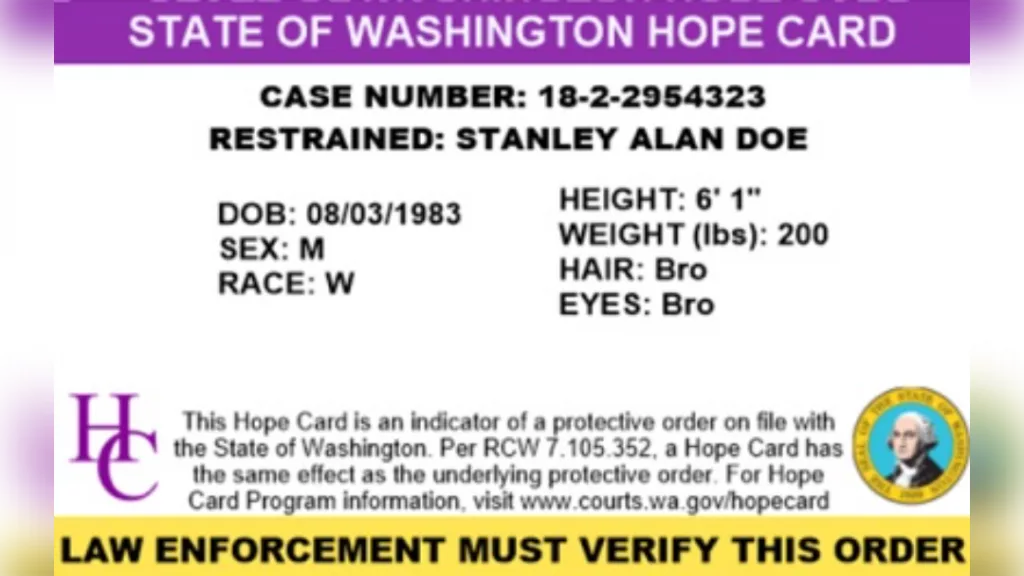OLYMPIA, WA – A Washington state lawmaker is backing a bill to tweak a program he helped establish that offers wallet-sized cards with information about a protection order.
The Hope Card Program, enacted in 2023 via House Bill 1766 and implemented at the beginning of this year, offers the namesake cards that contain concise information regarding a protection order. Previously, those under a protection order had to carry bulky documents.
A protection order is a type of restraining order that the petitioner can file against another person who is allegedly committing harm. It is a civil court order, issued by a judge. There are several different types of civil protection orders available in Washington, in cases of domestic violence, sexual assault, stalking, harassment, vulnerable adult, and extreme risk cases.
“Two years ago, we did something that many in this Legislature said couldn’t be done, Rep. Dan Griffey, R-Allyn, stated during a Thursday public hearing on Substitute House Bill 1460 before the Senate Law & Justice Committee. “We took a large packet of papers which is a protection order, and we miniaturized it down to a little tiny card. Hundreds of them have been issued.”
Griffey told committee members the Administrative Office of the Courts issues the cards.
“It’s up and running, and we’ve issued hundreds of Hope Cards,” he said. “What this is doing is further tuning up what we did two years ago.”
SHB 1460 makes several adjustments to the program, including changing the source of Hope Cards from the clerk of the issuing court to the Administrative Office of the Courts Hope Card Program; no longer requiring Hope Cards to be in scannable, electronic format; no charging fees for issuance of Hope Cards; and limiting the identifying information on Hope Cards to the names and dates of birth of the restrained subjects and the protected persons.
“We’re just not going to charge for them,” Griffey said. “The people that are asking for these are the people that I think society should give the most mercy and grace to.”
Committee Chair Sen. Manka Dhingra, D-Seattle, asked Griffey why those seeking a protection order can’t just get a Hope Card from a local court.
“If a permanent order is entered by the court, the clerk is going to hand them a piece of paper and say get ahold of the Administrative Office of the Courts. The court clerks don’t have an ability to do this right now; they are telling us they are overwhelmed,” Griffey explained, noting that with AOC already handling the program and having all the required equipment, expanding it to individual courts would be more costly.
Scott Ahlf, chief legal counsel at the Administrative Office of the Courts, testified in support of the bill.
“We have issued 831 cards since Jan. 1st,” he told the committee.
He shared a story of one woman who came in to get her Hope Card.
“They had a protection order for years, and those protection orders can be anywhere from 12 to 16 pages long,” Ahlf said. “So, to carry that around is a significant burden. After she got the card, she made the effort to call our staff and said all she had to do was carry the card around, so this just takes away some of the trepidation. They’re already dealing with things that have disrupted their lives, so this is one more thing to help them out.”
Griffey said he’s hopeful that the Appropriations Committee will include funding for the program, estimated at $86,000.
The bill is scheduled for executive session in the Senate Law & Justice Committee at 9 a.m. on April 1.
This article was originally published by The Center Square on March 28, 2025, and is republished with permission. Read the original article here.





